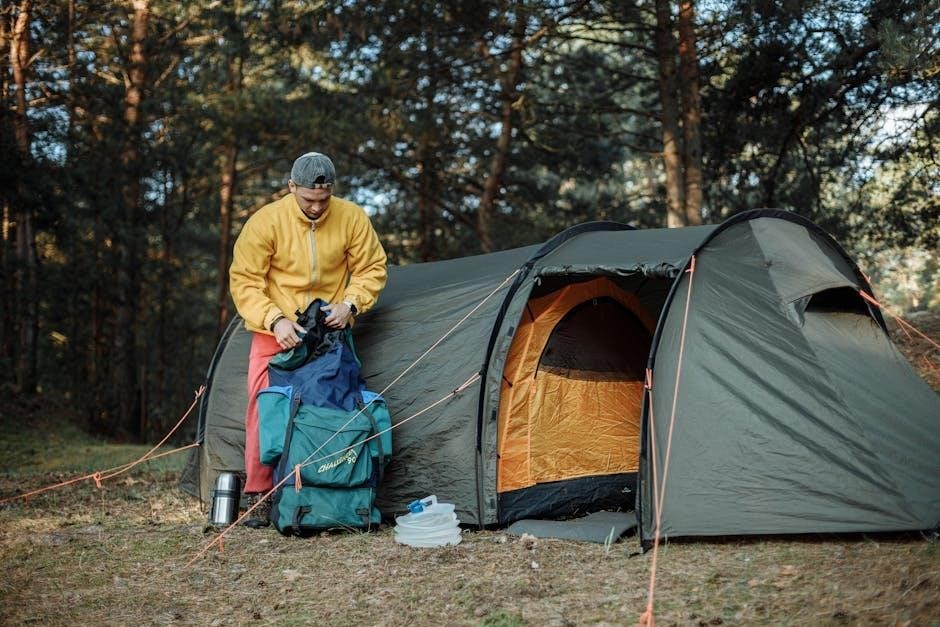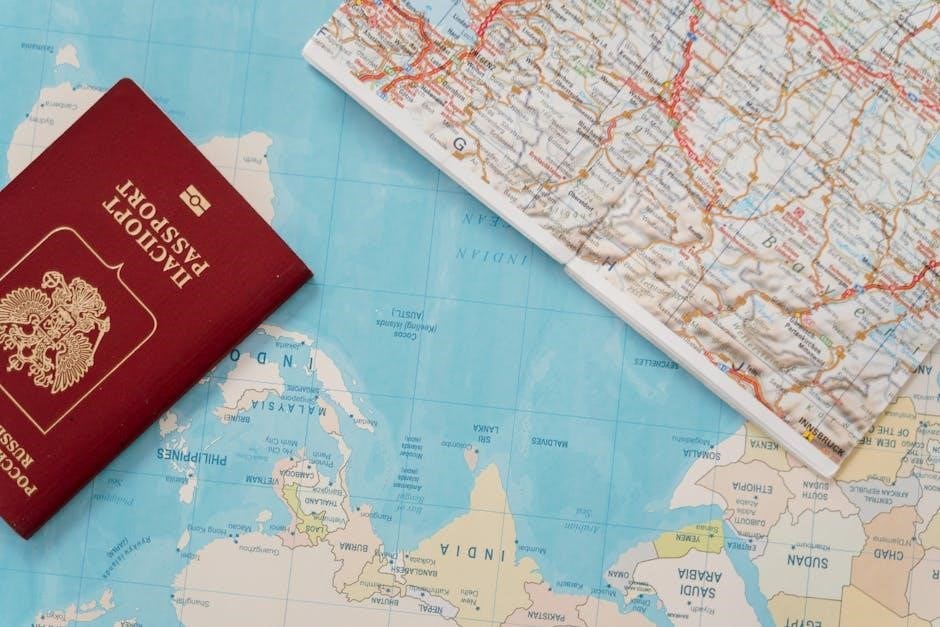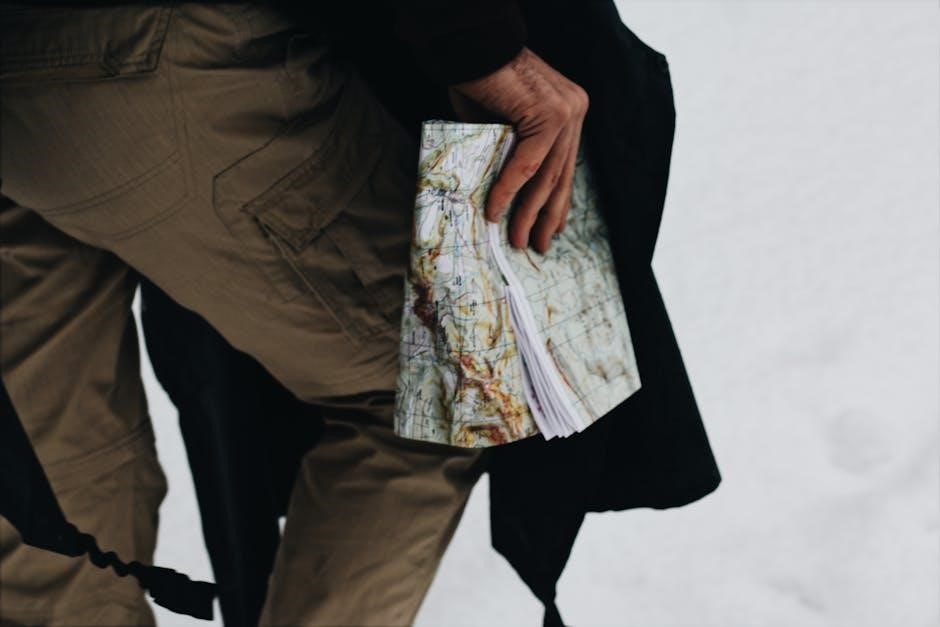Embarking on a guided backpacking trip is an excellent way for beginners to explore nature safely and gain essential skills. These trips offer structured experiences in stunning locations like national parks.
What are Guided Backpacking Trips?
Guided backpacking trips are organized outdoor adventures where experienced guides lead small groups through wilderness areas. These trips cater to beginners by providing logistical support‚ including permits‚ meals‚ and gear. Guides also offer instruction on essential skills like map reading and campsite setup. Participants carry their own gear‚ fostering self-sufficiency and a deep connection with nature.
Why Choose a Guided Trip for Your First Backpacking Experience?
Opting for a guided trip for your first backpacking adventure offers numerous advantages. Guides handle logistics‚ ensuring a hassle-free experience. They provide expertise in navigation‚ safety‚ and wilderness skills‚ boosting confidence. Guided trips foster a supportive environment for learning and exploration. With expert guidance‚ beginners can safely enjoy stunning destinations and develop a lifelong passion for backpacking.
Benefits of Guided Backpacking for Novices
Guided backpacking trips offer novices enhanced safety‚ skill development‚ and logistical support. These adventures ensure a smoother‚ more enjoyable introduction to the wilderness. They minimize risks and maximize learning opportunities for beginners.
Safety and Risk Management Provided by Guides
Guided backpacking trips significantly enhance safety for beginners through experienced guides. These professionals are skilled in risk assessment‚ first aid‚ and emergency response. Guides navigate challenging terrains‚ monitor weather conditions‚ and ensure group well-being. Their expertise minimizes potential hazards‚ allowing novices to explore the wilderness with greater confidence and security. This proactive approach ensures a safer and more enjoyable experience.
Learning Essential Backpacking Skills
Guided trips offer invaluable opportunities for beginners to acquire crucial backpacking skills. Participants learn map reading‚ navigation techniques‚ campsite selection‚ and proper food storage. Guides demonstrate how to set up tents‚ use backpacking gear efficiently‚ and practice Leave No Trace principles. This hands-on training builds confidence and competence‚ enabling novices to eventually undertake independent backpacking adventures with a solid foundation of knowledge and practical skills.
Logistics Handled: Permits‚ Meals‚ and Shuttles
One of the significant advantages of guided backpacking trips for beginners is the comprehensive logistical support provided. Tour operators handle obtaining necessary permits‚ planning nutritious meals‚ and arranging transportation‚ including shuttles to and from trailheads. This eliminates the stress of navigating complex administrative tasks and allows participants to focus on enjoying the experience. With logistics expertly managed‚ beginners can fully immerse themselves in the beauty of nature.

Essential Gear and Packing for Beginners
Proper gear and packing are crucial for a comfortable backpacking experience. Beginners should focus on selecting the right backpack‚ sleeping gear‚ clothing‚ and footwear. Guided trips often provide gear lists and recommendations.
Backpack Selection: Size‚ Fit‚ and Features
Choosing the right backpack is paramount for a comfortable and enjoyable backpacking trip. Consider torso length and hip size for a proper fit. Look for adjustable straps and a supportive hip belt. Features like multiple compartments‚ external attachment points‚ and durable materials enhance functionality. Guided trips often offer advice on pack selection.
Sleeping Gear: Bags‚ Pads‚ and Tents
Quality sleeping gear ensures a restful night in the wilderness. Select a sleeping bag rated for the expected temperatures. A sleeping pad provides insulation and cushioning. Tents should be lightweight‚ waterproof‚ and easy to set up. Guided trips may offer gear rentals or recommendations for beginners to ensure comfort and protection from the elements.
Clothing and Footwear Considerations
Choosing the right clothing and footwear is crucial for comfort and safety. Opt for moisture-wicking fabrics and layers to adapt to changing conditions. Sturdy‚ broken-in hiking boots provide support and prevent blisters. Pack rain gear for unexpected showers. Don’t forget essentials like socks‚ hats‚ and gloves. Guided trips often provide detailed gear lists to help beginners prepare.
Top Destinations in the USA for Beginner Backpacking Trips
The USA boasts numerous beginner-friendly backpacking destinations. National parks like Yellowstone and Glacier offer stunning scenery and well-maintained trails. These locations provide ideal settings for novices to experience the beauty of the wilderness.
Glacier National Park: Hiking and Scenery
Glacier National Park in Montana is a prime destination for beginner backpacking trips‚ offering breathtaking views and diverse trails. Guided tours provide access to the park’s stunning glaciers‚ pristine lakes‚ and lush forests. These trips are tailored to accommodate beginners‚ ensuring a safe and enjoyable experience while exploring the park’s natural beauty and iconic scenery.
Yellowstone National Park: Wildlife and Geothermal Features
Yellowstone National Park is perfect for beginners exploring wildlife and geothermal wonders on a guided trip. These trips offer safe exploration of geysers‚ hot springs‚ and diverse wildlife. Guides share expert knowledge about the park’s unique ecosystem. Beginners can enjoy backpacking without the stress of logistics‚ focusing on the beauty and educational aspects of Yellowstone’s features.
Grand Canyon National Park: Below-the-Rim Experiences
Grand Canyon National Park offers guided backpacking trips perfect for experiencing the canyon from below the rim. These adventures provide a unique perspective‚ exploring inner canyon trails with expert guidance. Beginners benefit from organized logistics‚ safety measures‚ and educational insights about the canyon’s geology. Guided trips ensure a memorable and secure introduction to backpacking in this iconic natural wonder.
Skills Covered on Guided Beginner Backpacking Trips
Guided backpacking trips teach essential skills. Participants learn map reading‚ campsite selection‚ food storage‚ and wildlife safety. Experts offer hands-on training‚ ensuring beginners gain confidence and competence in the outdoors.
Map Reading and Navigation
One of the most crucial skills taught on guided backpacking trips is map reading and navigation. Beginners learn to interpret topographic maps‚ use a compass‚ and understand elevation changes. Guides demonstrate how to plot routes‚ identify landmarks‚ and orient themselves in the wilderness. These skills enhance safety and independence while exploring the outdoors‚ building confidence for future adventures.
Campsite Selection and Setup
Guided trips teach beginners the art of campsite selection and setup. Guides demonstrate how to choose a site that is level‚ sheltered‚ and minimizes environmental impact. Participants learn to properly pitch tents‚ secure them against the elements‚ and organize their gear for easy access. Emphasis is placed on Leave No Trace principles to preserve the natural beauty of the wilderness.
Food Storage and Wildlife Safety
An essential skill taught on guided trips is proper food storage to ensure wildlife safety. Beginners learn various techniques‚ such as using bear canisters or hanging food bags‚ to prevent attracting animals to campsites. Guides emphasize the importance of keeping a clean campsite and being aware of surroundings to minimize encounters with wildlife‚ ensuring a safe and enjoyable experience.

Finding and Choosing a Guided Backpacking Trip
Selecting the right guided backpacking trip involves research and careful consideration. Look for reputable tour operators‚ assess trip difficulty‚ and read reviews. Ensure the trip aligns with your fitness level and interests.
Researching Reputable Tour Operators
Start by investigating tour operators specializing in beginner-friendly backpacking trips. Look for companies with certified guides and a strong safety record. Check their experience‚ qualifications‚ and affiliations with relevant outdoor organizations. Read online reviews and testimonials to gauge customer satisfaction and the quality of their services. Ensure they have proper permits for the areas they operate in‚ and verify their insurance coverage.
Considering Trip Length and Difficulty
Evaluate your fitness level and choose a trip that matches your abilities. Shorter trips‚ such as weekend overnights‚ are ideal for beginners. Look for trips with moderate daily mileage and elevation gain. Consider the terrain and weather conditions of the destination. Ensure the trip itinerary includes rest days and allows for acclimatization to altitude if necessary. Don’t overestimate your capabilities; start with an easier option.
Reading Reviews and Testimonials
Before booking a guided backpacking trip‚ thoroughly research the tour operator and read reviews from past participants. Look for feedback on the guides’ expertise‚ safety protocols‚ and overall trip organization. Pay attention to comments about the difficulty level and suitability for beginners. Check for consistent themes in the reviews‚ both positive and negative. Consider testimonials that mention specific aspects of the trip‚ such as the food‚ campsites‚ or group dynamics.
Preparing for Your Guided Backpacking Adventure
Adequate preparation is key for enjoying a guided backpacking trip. This involves physical training to build stamina‚ understanding gear lists‚ and mentally preparing for the challenges and rewards of wilderness exploration.
Physical Fitness and Training
Prioritize physical fitness to fully enjoy your guided backpacking experience. Begin a training regimen that includes cardiovascular exercises like hiking and running. Incorporate strength training to prepare for carrying a backpack. Gradually increase the distance and elevation of your hikes. This proactive approach minimizes the risk of injury and ensures a more comfortable and enjoyable trip.
Understanding Gear Lists and Recommendations
Carefully review the gear list provided by the tour operator. Understand the purpose of each item and why it’s recommended. Prioritize lightweight and durable gear to minimize pack weight. If you’re unsure about specific gear‚ consult with the tour operator or experienced backpackers. Proper gear ensures comfort‚ safety‚ and a more enjoyable experience on your guided backpacking trip.
Mental Preparation and Expectations
Prepare yourself mentally for the challenges of backpacking‚ like physical exertion and unpredictable weather. Embrace the opportunity to disconnect from technology and connect with nature. Understand that plans might change due to unforeseen circumstances. Maintain a positive attitude and be open to learning. Be prepared to adapt to the needs of the group and respect the wilderness environment during your trip.
What to Expect During a Guided Backpacking Trip
Expect a structured daily routine with hiking‚ camping‚ and educational sessions. You’ll interact with experienced guides and fellow participants. Be ready to adapt to varying wilderness conditions and enjoy the stunning scenery.
Daily Routine and Activities
A typical day on a guided backpacking trip starts with an early wake-up‚ followed by breakfast and packing up camp. The majority of the day will be spent hiking‚ with breaks for lunch and enjoying the scenery. Evenings involve setting up camp‚ preparing dinner‚ and potentially educational sessions from the guides‚ concluding with stargazing and rest.
Interaction with Guides and Fellow Participants
Guided backpacking trips offer unique opportunities to bond with both experienced guides and fellow outdoor enthusiasts. Guides provide expertise in navigation‚ safety‚ and wilderness skills‚ fostering a learning environment. Participants share experiences‚ offer support‚ and build camaraderie. This social interaction enhances the overall experience‚ creating lasting friendships and a supportive community within the natural setting.
Adapting to Wilderness Conditions
Backpacking involves embracing the unpredictability of nature‚ requiring adaptability to changing weather‚ terrain‚ and unforeseen challenges. Guided trips prepare beginners to handle these conditions with confidence. Participants learn to navigate trails‚ manage gear‚ and adjust plans as needed. Guides offer support‚ share insights‚ and foster resilience‚ enabling individuals to thrive in the wilderness and appreciate its raw beauty‚ despite any difficulties.

Cost Considerations for Guided Backpacking Trips
Guided backpacking trips involve various costs‚ including tour operator fees‚ gear rentals‚ and personal expenses. Understanding these costs helps beginners budget effectively. Comparing packages and considering the value offered ensures a worthwhile investment in an outdoor adventure.
Inclusions and Exclusions in Trip Packages
Carefully review what’s included in your guided backpacking trip. Typically‚ packages cover permits‚ meals‚ group gear like tents‚ and guide services. Exclusions may include personal gear (backpack‚ sleeping bag)‚ transportation to the starting point‚ alcoholic beverages‚ and optional activities. Knowing these details helps avoid unexpected expenses and ensures you’re well-prepared for your adventure in the wilderness.
Budgeting for Additional Expenses
While the trip package covers essentials‚ budget for extra costs. These might include transportation to the trailhead‚ pre- or post-trip accommodation‚ personal gear rentals if needed‚ snacks beyond provided meals‚ and souvenirs. Also‚ consider tipping your guides if you appreciate their service. Having a buffer ensures you can comfortably handle unforeseen circumstances or indulge in local treats along your backpacking journey.
Value and Return on Investment
Investing in a guided backpacking trip provides significant value. Beyond logistical ease and safety‚ you gain invaluable skills in navigation‚ wilderness survival‚ and Leave No Trace principles. The experience fosters confidence and a deeper appreciation for nature. Consider the long-term benefits of newfound skills and unforgettable memories when assessing the return on your financial investment in the adventure.

Ethical Considerations for Backpacking
Backpacking ethically involves minimizing environmental impact and respecting wildlife. Guided trips emphasize Leave No Trace principles‚ ensuring beginners learn to preserve natural spaces for future generations. These practices promote responsible outdoor recreation.
Leave No Trace Principles
Guided backpacking trips for beginners emphasize Leave No Trace principles‚ teaching participants to minimize their impact on the environment. These principles include planning ahead‚ traveling on durable surfaces‚ disposing of waste properly‚ leaving what you find‚ minimizing campfire impacts‚ respecting wildlife‚ and being considerate of other visitors. Adhering to these guidelines ensures the preservation of natural areas.
Respecting Wildlife and Nature
A core tenet of guided backpacking for beginners is instilling respect for wildlife and nature. Participants learn the importance of observing animals from a distance‚ avoiding feeding them‚ and understanding their natural habitats. Guides emphasize the need to protect vegetation and water sources‚ ensuring minimal disruption to ecosystems. Responsible interaction preserves the wilderness for future enjoyment.
Minimizing Environmental Impact
Guided backpacking trips for beginners focus on minimizing environmental impact through sustainable practices. Participants learn to properly dispose of waste‚ use biodegradable products‚ and avoid creating unnecessary fires. Guides educate on staying on established trails to prevent erosion and protecting water sources from contamination. By adhering to these principles‚ beginners develop a mindful approach to enjoying the wilderness responsibly.
Resources for Beginner Backpackers
Beginner backpackers can find valuable resources online through forums‚ communities‚ and outdoor retailers. Books and guides offer essential knowledge‚ while local clubs provide opportunities for learning and group outings.
Online Forums and Communities
Online forums and communities offer a wealth of knowledge for beginner backpackers. These platforms provide spaces to ask questions‚ share experiences‚ and gain insights from seasoned hikers. Beginners can learn about gear recommendations‚ trail conditions‚ and valuable tips for planning their first guided backpacking trips. Engaging with these communities fosters a supportive learning environment.
Books and Guides on Backpacking
Books and guides on backpacking serve as invaluable resources for beginners preparing for guided trips. These materials offer detailed information on essential skills such as navigation‚ campsite setup‚ and first aid. Beginners can gain a comprehensive understanding of backpacking principles‚ gear selection‚ and safety precautions. Consulting these resources enhances preparedness and confidence before embarking on a guided adventure.
Local Outdoor Retailers and Clubs
Local outdoor retailers and clubs are essential resources for beginner backpackers preparing for guided trips. These establishments offer expert advice on gear selection‚ fitting backpacks‚ and understanding essential equipment needs. Clubs often organize introductory workshops‚ group hikes‚ and informational sessions‚ providing valuable learning opportunities. Connecting with local retailers and clubs helps beginners build confidence and prepare effectively for their guided backpacking adventures.

